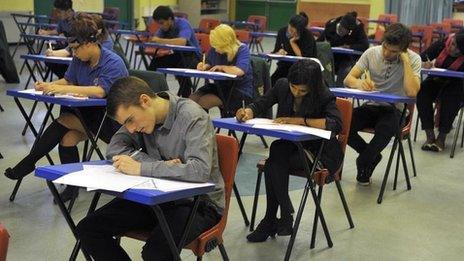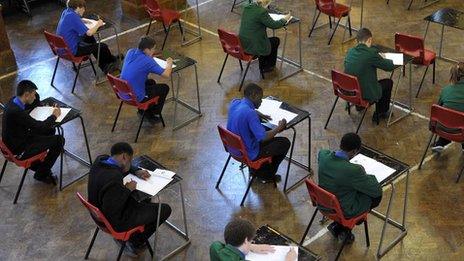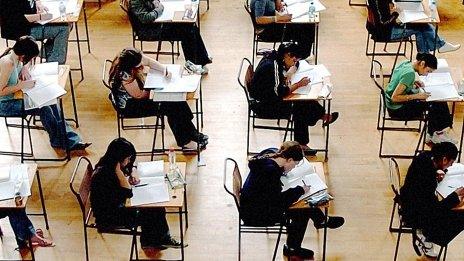Head teachers plan own league tables
- Published
- comments

The alternative league tables will appear before the government data
Head teachers in England have put forward plans to publish their own school league tables this autumn.
This would be separate from the official performance data published by the government, which is currently used to generate school rankings.
Heads want to include more information about schools than exam results, such as music and sport.
Heads' leader Brian Lightman said the current league tables "do not tell the whole story".
The proposals for alternative league tables, to be published on a free website, are being put forward by the Association of School and College Leaders, the National Association of Head Teachers and the United Learning group, which runs academies and independent schools.
They will begin with secondary school results from this summer's GCSE exams - with the aim of "bypassing" political involvement in school data.
Political levers
The planned alternative league tables would be published by schools earlier than the official tables, when parents were making school choices for the following year.
The heads say they want to present an independent and more inclusive view of schools - arguing that it will be more objective than the measures chosen by the government.
They argue that the way that league tables are now assembled is too closely aligned to promoting government policy.
"The tables have become less a way of giving parents the information they want and more an arms-length policy lever by which successive governments have sought to influence the decisions heads take about how to run their schools," said United Learning's chief executive, Jon Coles.
"This is too crude an approach to defining a great school or encouraging improvement and at different times, it has been detrimental in different ways.
"For example, promoting too much focus on the C/D borderline, especially in English and maths, or promoting choices of qualification which do not serve individual children well."
Another example has been the government's decision for league tables to recognise only a pupil's first entry in exams, as a way of deterring schools from entering younger pupils for exams and then retaking if they want to improve results.
Mr Lightman, general secretary of the Association of School and College Leaders, says that "the final results are the ones that really matter" and this should be available to parents.
"We want parents to have access to data they can use in a format they can use it," he said.
'Robust checks'
Mr Coles said that rather than criticising the government over league tables, it was time for the education profession to take responsibility for its own information.
The leader of the National Association of Head Teachers, Russell Hobby, said league tables in their current form were "too often serving political aims rather than pupils' needs and driving the wrong decisions".
"This initiative will, over time, give parents stable, accurate and neutral information about schools. It is good to see the school leaders seizing the initiative," he added.
The government has already announced plans for an overhaul of how league tables are assembled.
Instead of the current focus on five GCSEs at grade C or above, including English and maths, from 2016 they will show pupils' overall performance in eight subjects, including English and maths.
"We agree that information about school performance should be freely available to parents. That's why we have taken steps to make our league tables clearer and, in addition to our data, all schools must publish extensive information on their website - including pupil progress," said a Department for Education spokesman.
"Our tables are only published after robust checks so parents know the information we are giving them is accurate.
"Children should not be entered for exams before they're ready, and then for re-sits, or other exams in the same subject. Making more use of end-of-course exams for GCSEs will remove the incentive to game the system in this way."
- Published22 May 2014

- Published28 October 2011
- Published1 July 2014
